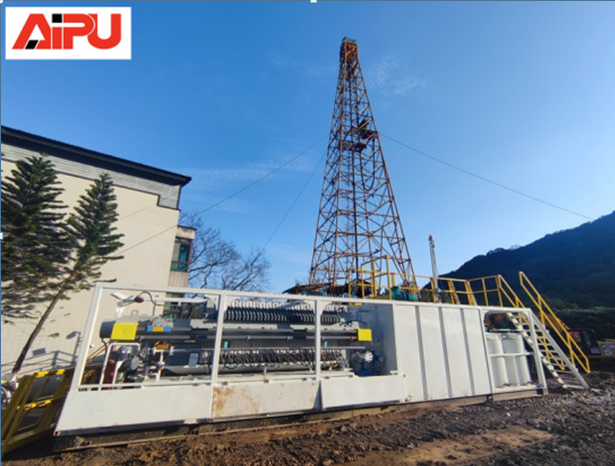How Equipment Maintains Drilling Fluid Integrity
Arctic drilling presents a unique set of challenges due to the extreme cold, icy terrain, and sensitive environmental conditions. Superior solids control equipment is essential to ensure the efficiency and safety of drilling operations in this harsh environment. This article will explore the key aspects of such equipment.
Design Considerations for Arctic Conditions
The design of solids control equipment for Arctic drilling must account for the low - temperature environment. Materials used in the construction of the equipment need to have excellent cold - resistance properties. For example, special alloys are often employed to prevent brittleness and cracking in extremely cold temperatures. Additionally, insulation is crucial to maintain the proper operating temperature of the equipment. The layout of the equipment also needs to be optimized to minimize heat loss and ensure easy access for maintenance in the harsh Arctic climate.
Functionality and Performance
Superior solids control equipment should have high - efficiency separation capabilities. It must be able to effectively remove solid particles of various sizes from the drilling fluid. In Arctic drilling, where the drilling fluid properties can change rapidly due to the cold environment, the equipment needs to be adaptable. For instance, shale shakers should have adjustable screens to handle different particle sizes, and centrifuges should be able to operate stably under varying loads. The equipment's performance should also be reliable, with minimal downtime to avoid costly interruptions in the drilling process.
Environmental Protection
Arctic ecosystems are extremely fragile, and environmental protection is of utmost importance in Arctic drilling. Solids control equipment plays a vital role in minimizing the environmental impact. It helps in reducing the amount of waste generated during drilling operations. By effectively separating solids from the drilling fluid, the equipment allows for the reuse of the fluid, which not only saves resources but also reduces the need for disposal of contaminated fluids. Moreover, the equipment should be designed to prevent any leakage of harmful substances into the surrounding environment.
Maintenance and Support
Regular maintenance is essential to keep the solids control equipment in optimal working condition. In the Arctic, where access to maintenance facilities can be difficult, the equipment should be designed for easy maintenance. This includes features such as quick - release components and easily accessible inspection points. Additionally, reliable technical support is necessary. Equipment manufacturers should provide on - site training for the drilling crew and have a rapid response mechanism to address any technical issues that may arise during the drilling operations.
In conclusion, superior solids control equipment for Arctic drilling requires careful design, high - performance functionality, strict environmental protection measures, and reliable maintenance and support. By meeting these requirements, the equipment can ensure the success and sustainability of Arctic drilling operations.

Design Considerations for Arctic Conditions
The design of solids control equipment for Arctic drilling must account for the low - temperature environment. Materials used in the construction of the equipment need to have excellent cold - resistance properties. For example, special alloys are often employed to prevent brittleness and cracking in extremely cold temperatures. Additionally, insulation is crucial to maintain the proper operating temperature of the equipment. The layout of the equipment also needs to be optimized to minimize heat loss and ensure easy access for maintenance in the harsh Arctic climate.
Functionality and Performance
Superior solids control equipment should have high - efficiency separation capabilities. It must be able to effectively remove solid particles of various sizes from the drilling fluid. In Arctic drilling, where the drilling fluid properties can change rapidly due to the cold environment, the equipment needs to be adaptable. For instance, shale shakers should have adjustable screens to handle different particle sizes, and centrifuges should be able to operate stably under varying loads. The equipment's performance should also be reliable, with minimal downtime to avoid costly interruptions in the drilling process.
Environmental Protection
Arctic ecosystems are extremely fragile, and environmental protection is of utmost importance in Arctic drilling. Solids control equipment plays a vital role in minimizing the environmental impact. It helps in reducing the amount of waste generated during drilling operations. By effectively separating solids from the drilling fluid, the equipment allows for the reuse of the fluid, which not only saves resources but also reduces the need for disposal of contaminated fluids. Moreover, the equipment should be designed to prevent any leakage of harmful substances into the surrounding environment.
Maintenance and Support
Regular maintenance is essential to keep the solids control equipment in optimal working condition. In the Arctic, where access to maintenance facilities can be difficult, the equipment should be designed for easy maintenance. This includes features such as quick - release components and easily accessible inspection points. Additionally, reliable technical support is necessary. Equipment manufacturers should provide on - site training for the drilling crew and have a rapid response mechanism to address any technical issues that may arise during the drilling operations.
In conclusion, superior solids control equipment for Arctic drilling requires careful design, high - performance functionality, strict environmental protection measures, and reliable maintenance and support. By meeting these requirements, the equipment can ensure the success and sustainability of Arctic drilling operations.








